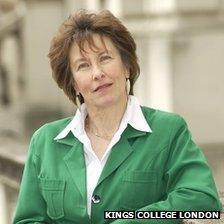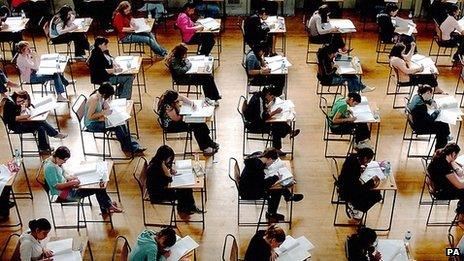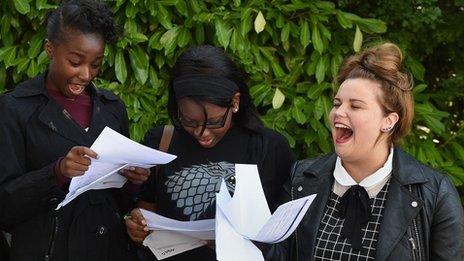Do GCSEs still matter with a school leaving age of 17?
- Published
- comments

The leaving age has risen to 17 and will rise again to 18
With the school leaving age now 17 in England, how important are GCSEs?
From last September young people up to the age of 17 have been expected to stay in full-time education - either at school or college, in an apprenticeship or in employment with training.
The leaving age is due to rise again to 18 from September 2015.
As students in England, Wales and Northern Ireland discover their grades, do GCSEs still matter? Or are their days numbered?
Prof Alison Wolf, a specialist in the relationship between education and the labour market at King's College London, argues that GCSEs remain an important benchmark as the results determine students' progress into their next stage of education, training or employment.
National standard
"Yes they do matter as not everyone does A-levels", said Prof Wolf, who authored the English government's 2011 review of vocational education, external.

GCSEs provide "a clear national standard", says Prof Alison Wolf
"Employers, universities and further education colleges care about students' performance in the core maths, English and science GCSEs.
"GCSEs do not need to be replaced, though I think there is a case to be made between core GCSEs, where we need to work really hard to ensure we have a single clear national standard at all times, and others where we can afford to be more easy going - but that's a slightly different matter.
"GCSEs are in the DNA of the country, the labour market recognises them and you would abolish them at your peril."
However Prof Alan Smithers, director of Buckingham University's Centre for Education and Employment Research, would prefer to see GCSEs replaced with exams at 14 or 15.
This would mean a fundamental restructuring of secondary education.
"If we are to make full use of the raising of the participation age to 18 it would make more sense for the exams to be moved to age 14.
"If the exam structure was changed to exams at 14, young people would have four years to specialise on academic courses or more direct routes to employment."
Such a move would bring England more into line with European education systems where assessments at 14 determine their future educational paths, says Prof Smithers.
Under the current system however he says that GCSEs still matter "very much to schools" because the main performance measure is focused on GCSEs.
He adds that plans to decouple AS-levels from A-levels will mean universities are more likely to base their offers on GCSE results.
'Detrimental'
Brian Lightman, general secretary of the Association of School and College Leaders, says now is not the time for the upheaval that such a change in exam timing would require.
"We've seen almost continuous structural change in recent decades. What we need to do now is to focus on outcomes and the quality of teaching to ensure all students achieve the best outcomes in whatever course they are following.

It would be "detrimental" to abolish GCSEs says ASCL's Brian Lightman
"At present it's important to have a measure of how students have achieved at the end of their time in a particular institution.
"Because we have a large number of 11 to 16 schools and pupils pursue a wide range of different routes after 16, it would be detrimental to abolish GCSEs."
Mr Lightman adds that in the long term he would like to see a baccalaureate style qualification for 18-year-olds "which would encompass both vocational and academic options".
In the short term, the shake-up to GCSEs in England continues.
This year's GCSEs are the first to depend on exams at the end of two years while winter resits and coursework have also been phased out.
New courses in English and maths are due to start from September 2015 and new courses in about 20 other subjects will begin the following year.
The GCSE grading system will also change with the introduction of numbers instead of letters.
Exams will be graded from 1 to 9, with 9 being the highest. Pupils who fail will be awarded a "U" for an unclassified result.
- Published21 August 2014

- Published21 August 2014

- Published21 August 2014

- Published2 September 2013

- Published21 March 2013

- Published3 March 2011
- Published22 November 2010